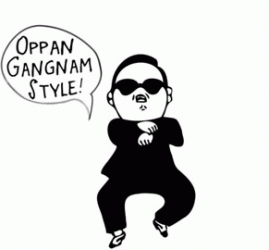In the article, Dal Yong Jin and Woongjae Ryoo presented the ideas of K-pop hybridization through the usage of English mixing in the songs. Jin and Ryoo suggested that K-pop becomes a culture phenomenon “because of its rapid penetration in the global market and culture” (2014: 115). This concept also applied to Psy in different aspects.
Psy used an English name abbreviation instead of a Korean name when debuted, which is easier for people to recognize him. Also, almost all of his song names are in English. He widely used some simple English lyrics in the songs with repeated melody, which allows people to memorize and sing even they do not know Korean languages. For example, the lyric “mother-father-gentleman” in “Gentleman” has been repeated many times throughout the song. He also mixed the Western genres and styles such as Hip Hop and rap into the songs.
Jin and Ryoo stated that the application of English is because the entertainment companies want to “penetrate the Asian market, and eventually the Western market” (Ibid., 120). Psy cooperated with American artists such as Snoop Dogg in “Hangover”. He also appeared in American variety shows like the American Idol. He held concerts and attended award ceremony in America in 2012 too.
With the development of social media, K-pop artists use English to “target young generations who seek entertainment embedded in new media” (Ibid., 121). Psy became famous internationally because of his song “Gangnam Style” which was uploaded on YouTube. The social media connect to the world and make it accessible for the Western countries.
Cultural hybridization through English mixing plays an important role in K-pop industry. The success of Psy supported the ideas of what Jin and Ryoo said.
Bibliography
Jin, Dal Yong, and Woongjae Ryoo. “Critical Interpretation of Hybrid K-Pop: The Global-Local Paradigm of English Mixing in Lyrics.” Popular Music and Society 37, no. 2 (2014): 113-131.

